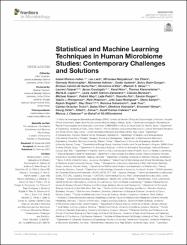| dc.contributor.author | Bakir-Gungor, Burcu | |
| dc.contributor.author | Moreno-Indias, Isabel | |
| dc.contributor.author | Lahti, Leo | |
| dc.contributor.author | Nedyalkova, Miroslava | |
| dc.contributor.author | Elbere, Ilze | |
| dc.contributor.author | Roshchupkin, Gennady | |
| dc.contributor.author | Adilovic, Muhamed | |
| dc.contributor.author | Aydemir, Onder | |
| dc.contributor.author | Santa Pau, Enrique Carrillo-de | |
| dc.contributor.author | D'Elia, Domenica | |
| dc.contributor.author | Desai, Mahesh S. | |
| dc.contributor.author | Falquet, Laurent | |
| dc.contributor.author | Gundogdu, Aycan | |
| dc.contributor.author | Hron, Karel | |
| dc.contributor.author | Klammsteiner, Thomas | |
| dc.contributor.author | Lopes, Marta B. | |
| dc.contributor.author | Marcos-Zambrano, Laura Judith | |
| dc.contributor.author | Marques, Claudia | |
| dc.contributor.author | Mason, Michael | |
| dc.contributor.author | May, Patrick | |
| dc.contributor.author | Pasic, Lejla | |
| dc.contributor.author | Pio, Gianvito | |
| dc.contributor.author | Pongor, Sandor | |
| dc.contributor.author | Promponas, Vasilis J. | |
| dc.contributor.author | Przymus, Piotr | |
| dc.contributor.author | Saez-Rodriguez, Julio | |
| dc.contributor.author | ampri, Alexia | |
| dc.contributor.author | Shigdel, Rajesh | |
| dc.contributor.author | Stres, Blaz | |
| dc.contributor.author | Suharoschi, Ramona | |
| dc.contributor.author | Truu, Jaak | |
| dc.contributor.author | Truica, Ciprian-Octavian | |
| dc.contributor.author | Vilne, Baiba | |
| dc.contributor.author | Vlachakis, Dimitrios | |
| dc.contributor.author | Yilmaz, Ercument | |
| dc.contributor.author | Zeller, Georg | |
| dc.contributor.author | Zomer, Aldert L. | |
| dc.contributor.author | Gomez-Cabrero, David | |
| dc.contributor.author | Claesson, Marcus J. | |
| dc.date.accessioned | 2022-03-05T10:37:42Z | |
| dc.date.available | 2022-03-05T10:37:42Z | |
| dc.date.issued | 2021 | en_US |
| dc.identifier.issn | 1664-302X | |
| dc.identifier.other | PubMed ID33692771 | |
| dc.identifier.uri | https //doi.org/10.3389/fmicb.2021.635781 | |
| dc.identifier.uri | https://hdl.handle.net/20.500.12573/1246 | |
| dc.description | This study was supported by the COST Action CA18131 "Statistical and machine learning techniques in human microbiome studies." IM-I was supported by the "MS type I" program (CP16/00163) from the Instituto de Salud Carlos III and co-funded by Fondo Europeo de Desarrollo Regional-FEDER. MN was grateful for the additional support by the project "Information and Communication Technologies for a Single Digital Market in Science, Education and Security" of the Scientific Research Center, NIS-3317 and National roadmaps for research infrastructures (RIs) grant number NIS-3318. LL was supported by Academy of Finland (decision 295741). IE was supported by H2020-EU.4.b. project "Integration of knowledge and biobank resources in comprehensive translational approach for personalized prevention and treatment of metabolic disorders (INTEGROMED)" (grant agreement ID 857572). MD was supported by the Luxembourg National Research Fund (FNR) CORE grant (C18/BM/12585940). | en_US |
| dc.description.abstract | The human microbiome has emerged as a central research topic in human biology and biomedicine. Current microbiome studies generate high-throughput omics data across different body sites, populations, and life stages. Many of the challenges in microbiome research are similar to other high-throughput studies, the quantitative analyses need to address the heterogeneity of data, specific statistical properties, and the remarkable variation in microbiome composition across individuals and body sites. This has led to a broad spectrum of statistical and machine learning challenges that range from study design, data processing, and standardization to analysis, modeling, cross-study comparison, prediction, data science ecosystems, and reproducible reporting. Nevertheless, although many statistics and machine learning approaches and tools have been developed, new techniques are needed to deal with emerging applications and the vast heterogeneity of microbiome data. We review and discuss emerging applications of statistical and machine learning techniques in human microbiome studies and introduce the COST Action CA18131 "ML4Microbiome" that brings together microbiome researchers and machine learning experts to address current challenges such as standardization of analysis pipelines for reproducibility of data analysis results, benchmarking, improvement, or development of existing and new tools and ontologies. | en_US |
| dc.description.sponsorship | European Cooperation in Science and Technology (COST) CA18131
European Commission CP16/00163
project "Information and Communication Technologies for a Single Digital Market in Science, Education and Security" of the Scientific Research Center NIS-3317
National roadmaps for research infrastructures (RIs) NIS-3318
Academy of Finland 295741
H2020-EU.4.b. project "Integration of knowledge and biobank resources in comprehensive translational approach for personalized prevention and treatment of metabolic disorders (INTEGROMED)" 857572
Luxembourg National Research Fund (FNR) CORE grant C18/BM/12585940 | en_US |
| dc.language.iso | eng | en_US |
| dc.publisher | FRONTIERS MEDIA SAAVENUE DU TRIBUNAL FEDERAL 34, LAUSANNE CH-1015, SWITZERLAND | en_US |
| dc.relation.isversionof | 10.3389/fmicb.2021.635781 | en_US |
| dc.rights | info:eu-repo/semantics/openAccess | en_US |
| dc.subject | machine learning | en_US |
| dc.subject | microbiome | en_US |
| dc.subject | ML4Microbiome | en_US |
| dc.subject | personalized medicine | en_US |
| dc.subject | biomarker identification | en_US |
| dc.title | Statistical and Machine Learning Techniques in Human Microbiome Studies: Contemporary Challenges and Solutions | en_US |
| dc.type | article | en_US |
| dc.contributor.department | AGÜ, Mühendislik Fakültesi, Bilgisayar Mühendisliği Bölümü | en_US |
| dc.contributor.institutionauthor | Bakir-Gungor, Burcu | |
| dc.identifier.volume | Volume 12 | en_US |
| dc.relation.journal | FRONTIERS IN MICROBIOLOGY | en_US |
| dc.relation.publicationcategory | Makale - Uluslararası - Editör Denetimli Dergi | en_US |


















